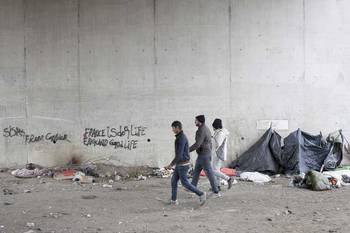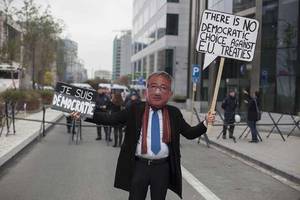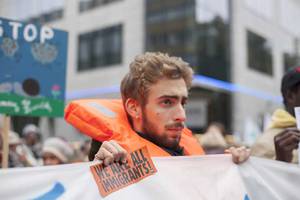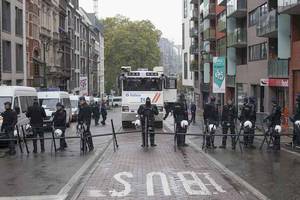Report on the situation in the refugee camp in Calais and the OX15! mobilisation in Brussels mid October.
Growing migrant camps in Calais
Calais is a city in the north of France, located at the narrowest part of the English Channel. It is the closest continental point to the British Isles and it has around seventy thousand inhabitants. It is famous because of its historic role in numerous wars, starting from the Hundred Years’ War to the Second World War.
However, we are not interested in the rich history of this city, rather in its role as a base for thousands of migrants who have been arriving to this part of France from their war-torn countries for the past fifteen years in the hope of reaching Dover and Great Britain. Near the port of Calais there is a temporary refugee camp for refugees from the Middle East and Africa. In the ‘Jungle’, the name of the refugee camp, the refugees settle in their temporary homes from which in the dark of the night, hiding under trucks or under decks of ferries and car boots, they try to cross without being caught by the strict controls, in order to find a better life in Great Britain.
We pass through makeshift housing, across mud and water. Around us hundreds of colourful tents, that from afar resemble some sort of festival. Within the migrant camps there is already an improvised trade system. In one of the tents, Ibrahim, who arrived only 12 days earlier, is filling already prepared tobacco paper with tobacco. On one of the barracks a cynical sign stands ‘Hotel’, on the other a big hello to America, perhaps as the ultimate goal of the refugees. In the camp, ‘Jungle II’, there are more than six thousand people. Their suffering is much like the suffering of the Balkan refugees during the past few months. The fence and wires that have been put up surrounding the port and entry to the English Channel are the same as the ones put up in Hungary, Bulgaria and Greece. For the refugees in Calais, France is a temporary residence, same as Hungary is for the refugees in the Balkans. Great Britain is their promised land; Germany is the same for ‘our’ refugees. 
Every night people try and jump over the metal fence surrounding the port and the English Channel. Usually they divide themselves into groups, so that the police cannot catch all of them, they do this until one of the groups, with more or less luck succeeds in reaching the railway or the English Channel. Recently two people died here. The police and the Eurotunnel representatives are claiming that it is impossible to control the situation. It’s hard to imagine a refugee camp in the heart of the political and economic centre of Europe, where people are living without the basics, without water and in mud, under makeshift shelters and in tents. Everyone wants to leave as soon as possible from this place. According to the latest news, France is looking to dismantle the camps and resettle the refugees. We will see what will happen.
“Unfortunately, there is a lack of coordination among the humanitarian organisations. The conditions, as you can see, are very bad. Some people have been forced to stay here for months, even those looking for asylum”, complained Maria Hernandez, a volunteering psychologist from the Canary Island.
We have noticed that people have been grouped according to their nationalities. In the eastern part of the camp there are mostly Africans, people from Eritrea, Sudan and Ethiopia. Next to them are people from Afghanistan, followed by people from Syria, and there are also refugees from Iran and Kuwait. In the meantime, international organisations have erected a church, a temporary school, prayer rooms, a library and improvised showers. In one of the large tents men gather to spin reused bicycle wheels in order to charge mobile phones. There is silence and tension as twenty French, fully equipped, soldiers with rifles pass through the camp.
OX15: Brussels demonstrations
Going from Calais to Brussels, we witnessed the preparations for the EU leaders’ summit, mid October, the meeting of the European Council that discussed among other things the deportation of 400,000 economic refugees. Those against have been protesting for days in Brussels and left-wing socialist movement groups and political parties from around Europe have been meeting under their common name OX15. They have been protesting at the Alter Summit under the slogan ‘Oxi! Basta! Enough! Build another Europe!’. They are protesting against trade agreements between the US and the EU, therefore against the TTIP and CETA, against austerity measures and the anti-migrant policies of the EU. This meeting is being used to gather all left-wing European political groups and focus on the invitation of the organisation Blockupy, with the ideas of spreading the Greek message “Oxi! No!” throughout Europe in response to the Troika politics.
Unlike the humanitarian response in Croatia, the activists in Brussels are focusing on the urgent need to examine the political situation.
“What Hungary is doing today is what Spain and France have been doing politically for a while now”, says MEP Miguel Urban from Podemos.
“We have to oppose the idea of shelling ships on which the migrants travel to Europe. We must not accept the false distinctions between refugees and economic migrants. By establishing the so-called hotspots we will also deport people who have not fled because of war. We must not agree to this and we must look for a better solution, so that we can directly influence this type of politics. We must not allow refugee reception centres to fall into hands of private companies, as predicted. Europe is setting the stage for right-wing politics. When we are talking about migrants, we must realise that we are talking about workers”, continues Urban.
Migration has become one of the most discussed topics within central European politics, as well as within European social movements, shown partially in Brussels. Nobody is talking about a humanitarian crisis any longer, rather about the Schengen and Dublin agreements and the crisis in which the EU finds itself, perhaps its most serious crisis since the beginning. In light of the migration crisis and the refugees in Brussels political uncertainties have become apparent, the disagreements between the north and south, between rich and poor countries, between the European periphery and its centre. It comes as no surprise that the EU leaders have not agreed on anything concrete. The only thing they did agree on is bribing Turkey, Germany’s plan to offer three million euros as a reward for the future integration of migrants, the possibility of visa-free travel for their citizens from 2016 and the promise of resuming suspended negotiations for EU membership.
The president of the European Commission, Jean-Claude Juncker, has said that the EU leaders intend to leave around two million Syrian refugees in Turkey, a country that could in the near future be considered a ‘safe country’. Even though only recently during peaceful demonstrations over a hundred people were killed and state repression is stronger than ever. At the same time this is a country known for its ill treatments of asylum seekers.
 Restrictive policies affecting refugees still persist. The consensus to strengthen the outer borders of the EU remains in place, which resulted in additional financing of FRONTEX that for this needed to employ 775 new people. Therefore in the upcoming period we can expect mass deportation of all peoples that are not welcomed, these will include primarily people who are considered to be economic migrants or those who migrated because of devastating consequences of climate change. At the same time, countries in Europe’s periphery, in exchange for investments and a variety of other benefits, will take on the role of the so called hotspots, where the migrants will be detained against their will and often without adequate protection.
Restrictive policies affecting refugees still persist. The consensus to strengthen the outer borders of the EU remains in place, which resulted in additional financing of FRONTEX that for this needed to employ 775 new people. Therefore in the upcoming period we can expect mass deportation of all peoples that are not welcomed, these will include primarily people who are considered to be economic migrants or those who migrated because of devastating consequences of climate change. At the same time, countries in Europe’s periphery, in exchange for investments and a variety of other benefits, will take on the role of the so called hotspots, where the migrants will be detained against their will and often without adequate protection.
Germany is very well aware that ultimately it can benefit, practically starting a new accumulation cycle, this time reliant on cheap refugee labour. Italians are the biggest opposition to hotspots; they clearly stated they do not want ‘concentration camps’ on their territory. Despite the Italians dissatisfaction, the first of these camps, in which all of the migrants will be biometrically registered, will be situated on the Italian island of Lampedusa and on the Greek island of Lesbos.
 On the streets of Brussels during the EU summit the security was at its maximum. The structure of European politics and the power of the police were apparent, as on every corner there were metal barriers with spiked fences, trucks with water tanks and soldiers with rifles. Indeed, the same soldiers that were posted on the Hungarian border were on the streets surrounding the building of the European Commission and other high power companies. Helicopters were circling the city and plain clothed police officers and CCTV cameras monitored every activity.
On the streets of Brussels during the EU summit the security was at its maximum. The structure of European politics and the power of the police were apparent, as on every corner there were metal barriers with spiked fences, trucks with water tanks and soldiers with rifles. Indeed, the same soldiers that were posted on the Hungarian border were on the streets surrounding the building of the European Commission and other high power companies. Helicopters were circling the city and plain clothed police officers and CCTV cameras monitored every activity.
As part of the Alter Summit a European march was held during which a few thousand people walked by important buildings of the Brussels administration. They stopped in front of the Turkish and German embassies in order to highlight the negative role both the Chancellor Angela Merkel and President Recep Tayyip Erdogan have played in the migrant crisis. The Chancellor did not only promise deportation, but first planes with the unfortunate migrants have already been flown out of Germany and back to Turkey and to some countries in the Balkans. Erdogan is just as bad with his brutal politics towards Syrian refugees in Ankara.
The Belgium – Israel football game took place during the seven-day Alter Summit and it was used to protest against Israeli politics towards the Palestinians. At multiple locations in the city meetings were held discussing this particular topic. The peak was on October 15, when certain areas of the city were blocked, mostly the area with EU administrative buildings. Apart from the media presence, the attempt to encourage people to take up new policies and join in the unification of the European social movement, the results of the demonstration were 104 arrested protestors.
One call of action stated that the time is coming to form new alliances within the European social movement, which could result in a so far unseen political front with the aim of rebuilding Europe from the bottom up.
All pictures by Davor Konjikusic